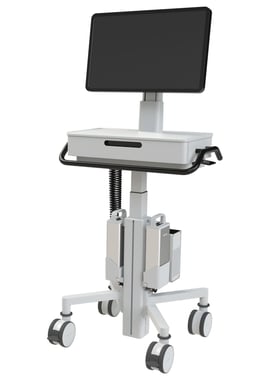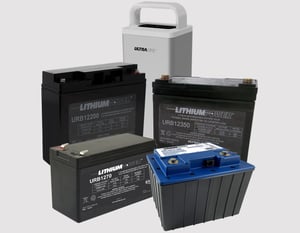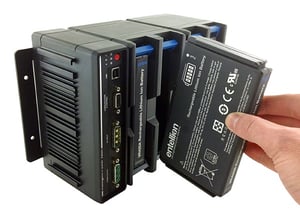 Computer and medical carts are increasingly used to reduce the need for paperwork in hospitals, warehouses, schools and more. This has resulted in many different types of cart – in hospitals and clinics alone there are Emergency Carts, Anaesthesia Carts, Procedure Carts, Mobile Computing Carts, Medication Carts and more.
Computer and medical carts are increasingly used to reduce the need for paperwork in hospitals, warehouses, schools and more. This has resulted in many different types of cart – in hospitals and clinics alone there are Emergency Carts, Anaesthesia Carts, Procedure Carts, Mobile Computing Carts, Medication Carts and more.
However, the main issue restricting their use is lack of space inside a facility or fixed equipment causing an obstruction (a survey conducted by Ergotron and HIMSS Analytics revealed).
Stemming from this, developments in battery technology are paving the way for smaller computer and medical carts.
Ultralife and its subsidiary company, Accutronics, have extensive experience of designing and manufacturing embeddable and hot-swappable battery packs for medical carts, as well as power systems.
LEAD ACID REPLACEMENT
When reducing the size of any product is a high priority (including portable carts), the energy density of the battery should be considered. Sealed lead acid (SLA) batteries have poor volumetric and gravimetric energy density, so many OEMs that previously used this chemistry are switching to Lithium Iron Phosphate (LiFePO4) alternatives like Ultralife’s embeddable smart U1 battery (URB12450-U1-SMB) or hot-swappable URB-X5 battery. Both the U1's gravimetric energy density of 107Wh/kg and the URB-X5's gravimetric energy density of 81Wh/Kg are greater than that of the average lead acid battery, which ranges between 30-50Wh/kg.
 Yet reducing the size of the cart battery does not end with its energy density. Having the ability to integrate the power source in the most space efficient way is also beneficial.
Yet reducing the size of the cart battery does not end with its energy density. Having the ability to integrate the power source in the most space efficient way is also beneficial.
Unlike SLA batteries, the URB12450-U1-SMB can be mounted in any direction and does not require charging in a vented area. The removeable URB-X5 battery can be attached to the cart using the optional UCA-X5 docking cradle, which has a slender aluminium bracket to allow for multiple mounting locations.
So, as you can see, both of these batteries have their own unique way of reducing the size of a medical cart. However, as previously mentioned, there are many different types of cart and some will a have greater demand for power than others. There is no use in choosing the most space saving battery if it cannot deliver the power needed. Therefore, Ultralife has developed the URS-X5 medical cart power system. Whilst most customers will use the URS-X5 power system with one or two URB-X5 hot-swappable batteries, a hybrid configuration allows hot-swap batteries to be paired with the embeddable U1 battery when longer runtimes are required.
Intelligent Power Vault
Another power system, available from Accutronics, is The Intelligent Power Vault (IPV), which houses and intelligently charges up to eight VR420A batteries (versions accepting two, four and six are also available).
 The IPV boasts easier device integration than SLA and, once integrated, inserting and removing the VR420A batteries from the IPV has been made easy thanks to the polarised rails on either side of the batteries which allows them to be slid into the IPV along corresponding ribs.
The IPV boasts easier device integration than SLA and, once integrated, inserting and removing the VR420A batteries from the IPV has been made easy thanks to the polarised rails on either side of the batteries which allows them to be slid into the IPV along corresponding ribs.
Just as with the URS-X5 power system, the IPV is a flexible power system whereby adding more batteries extends runtime.
Plus, when all eight batteries are used, the IPV can store up to 714Wh, making it ideal for mission critical devices. Where power failure is not an option, the IPV boasts in-built power management capabilities. The IPV allows its installed VR420A batteries to communicate with the smart charging circuitry and control module inside the Intelligent Power Vault, in order to request the required voltage and current whilst charging and provide runtime information throughout discharge, ensuring safe and efficient operation always.
When it comes to selecting the best medical or computer cart battery, feedback from the end user may dictate the requirement. For instance, the need for a smaller cart means a smaller battery must be used and Ultralife offers a range of LiFePO4 batteries which are lighter and do not have the same integration requirements as sealed lead acid, allowing them to be integrated in a way that saves space. Accutronics is an Ultralife company located in the UK, ideally placed for shipments across Europe. A UK battery manufacturer, Accutronics also has an off-the-shelf IPV power management solution available for computer and medical carts that is lighter and easier-to-integrate than SLA.
(1) Tripp Lite: HC150SL, HCINT150SL, HC150ATD
(2) Ametek Powervar: ABCE150-11M2, ABCE150-22M2


